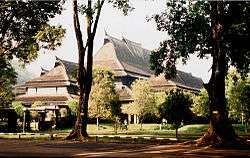Henri Maclaine Pont

Henri Maclaine Pont (21 June 1884 – 3 December 1971) was a Dutch architect and archaeologist active in Indonesia, acclaimed for his synthesis of Javanese and western architecture.[1] He is seen as the "father" of modern vernacular architecture of Indonesia.
Biography
Born in Batavia, Dutch East Indies in 1884, Henri Maclaine Pont studied civil engineering in Delft. After graduation he moved back to the Dutch East Indies where in 1911 received his first major work, the design of the Semarang-Cheribon Steam Tram Company headquarters.[1] In Semarang he set up his own firm, which was later joined by Thomas Karsten. Soon however he fell ill, and being forced to return to the Netherlands, sold the firm to Karsten, Lutjens and Steenstra Toussaint.[2]
He lived and worked in various places in Java and studied the Javanese pre-Islamic architecture. He wrote many articles in professional journals and had a polemic with prof. Wolff Schoemaker. In 1919 he has been commissioned for the design of the Ceremonial Hall of the Bandung Institute of Technology building.[1] The building is remarkable for the synthesis of Western technology and local architecture.[2] In 1943, he was put in an internment camp along with the many other Europeans during the Japanese occupation, and in 1945 was brought to Australia to recover. Due to the lack in job vacancies at the Bandung Technical School, he went left Indonesia for The Hague in 1947.
His notable works also include the original Trowulan Museum (1932) and the Puh Sarang Catholic church in Kediri (1937).[1]
References
External links
![]() Media related to Henri Maclaine Pont at Wikimedia Commons
Media related to Henri Maclaine Pont at Wikimedia Commons